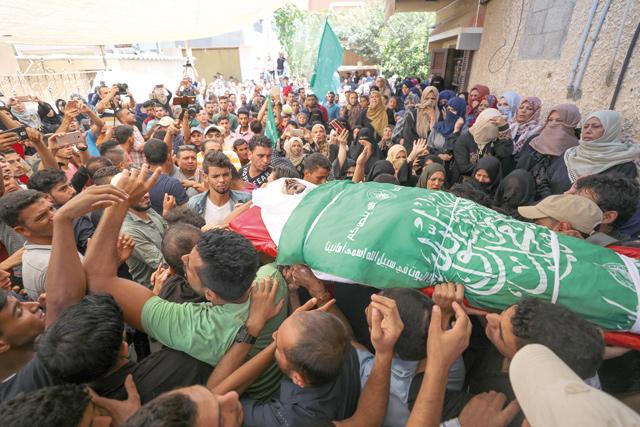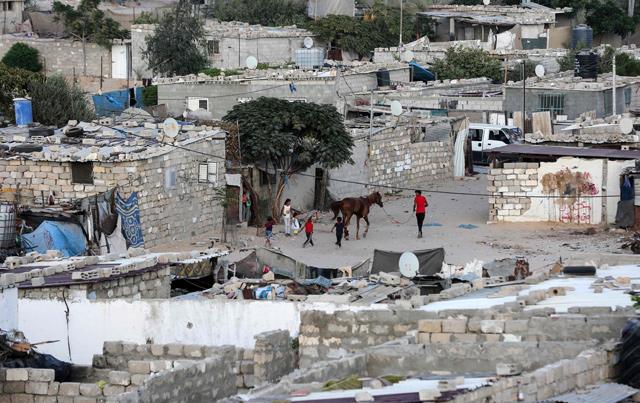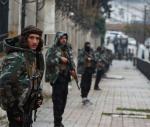You are here
Israel Gaza blockade takes more serious toll on life conditions
By AFP - Jul 22,2018 - Last updated at Jul 22,2018

People carry the dead body of Mohammed Abu Farhana, a member of the Ezzedine Al Qassam Brigades killed after Israeli attacks on Gaza Strip on Friday, during his funeral ceremony in Khan Younis, Gaza, on Saturday (Reuters photo)
OCCUPIED JERUSALEM — Israel said it would reopen its only goods crossing with the blockaded Gaza Strip on Tuesday if calm is maintained, a minister said, after having closed it July 9.
UN officials meanwhile warned that the Gaza Strip was facing serious fuel shortages affecting hospitals as well as water and sanitation facilities, calling for restrictions to be lifted.
Israeli Defence Minister Avigdor Lieberman said that “if today and tomorrow the situation continues as it was yesterday, then on Tuesday we will allow Kerem Shalom [goods crossing] to return to normal activity and the fishing zones will return to the same distances as before”.
Lieberman, speaking at the crossing, stressed that calm also meant an end to balloons carrying firebombs over the border fence from territory controlled by Hamas to burn Israeli farmland.
Israeli authorities claim hundreds of fires have been started by the firebombs since April.
Lieberman’s comments came after a ceasefire was reached following a major flare-up of violence between Palestinians in Gaza and Israel on Friday.
The escalation — the second in as many weeks — followed months of tension that have raised fears that war could erupt between Hamas and Israel.
The ceasefire followed a wave of deadly Israeli air strikes across Gaza sparked by the death of an Israeli occupation force officer shot near the border.
There has been relative calm on the Gaza border since the ceasefire.
‘Being fast depleted’
Israel announced on July 9 that the goods crossing was being closed to most deliveries, partly in response to the firebombs and other incidents along the border fence.
On July 17, it further tightened the restrictions to also prevent fuel deliveries while reducing the fishing zone Israel enforces off Gaza to 5.5km from 11km.
The crossing has remained open for food and medicine on a case-by-case basis.
The UN humanitarian coordinator for the Palestinian territories, Jamie McGoldrick, said Sunday that “supplies of emergency fuel provided by the UN for critical facilities in Gaza are being fast depleted”.
He called on Israel to end restrictions on fuel imports and warned hospitals could soon be forced to close, with emergency supplies set to run out in early August.
“Given ongoing blackouts of about 20 hours a day, if fuel does not come in immediately, people’s lives will be at stake, with the most vulnerable patients, like cardiac patients, those on dialysis, and newborns in intensive care, at highest risk,” he said in a statement.
Gaza suffers from a severe electricity shortage and relies on generators in many cases.
Mass protests and clashes erupted on the Gaza border on March 30 and have continued at varying levels since then.
At least 149 Palestinians have been killed by Israeli fire since March 30. The officer shot dead on Friday was the first Israeli killed.
Related Articles
OCCUPIED JERUSALEM — Israel partially re-opened its only goods crossing with the Gaza Strip on Tuesday after a two-week closure prompted by
OCCUPIED JERUSALEM — Israel reimposed a blockade on fuel deliveries to Gaza on Thursday, citing a resurgence in kites carrying firebombs ove
OCCUPIED JERUSALEM — Israel will reopen the Erez border crossing with the Gaza Strip on Monday, Defence Minister Avigdor Lieberman said, a w



















